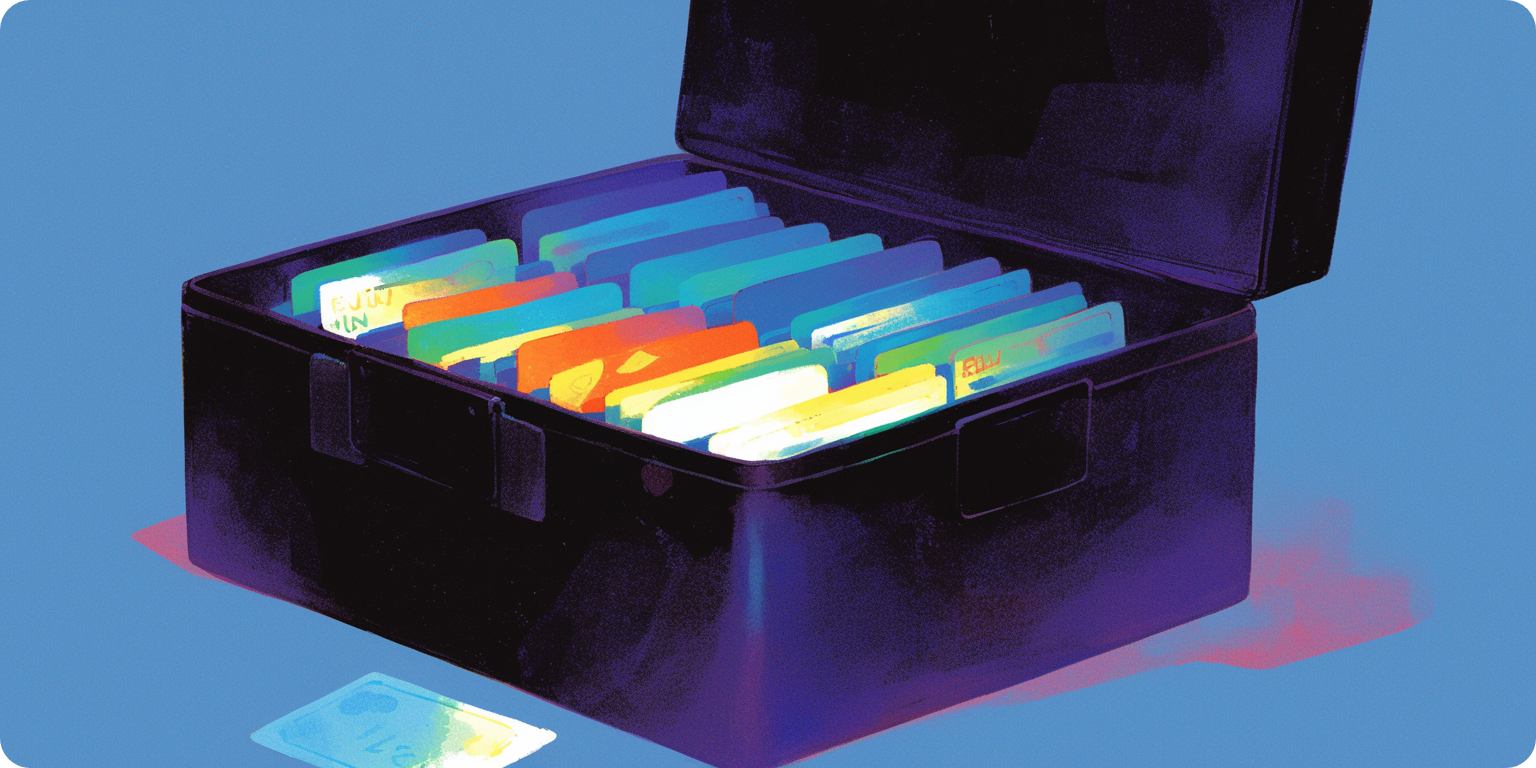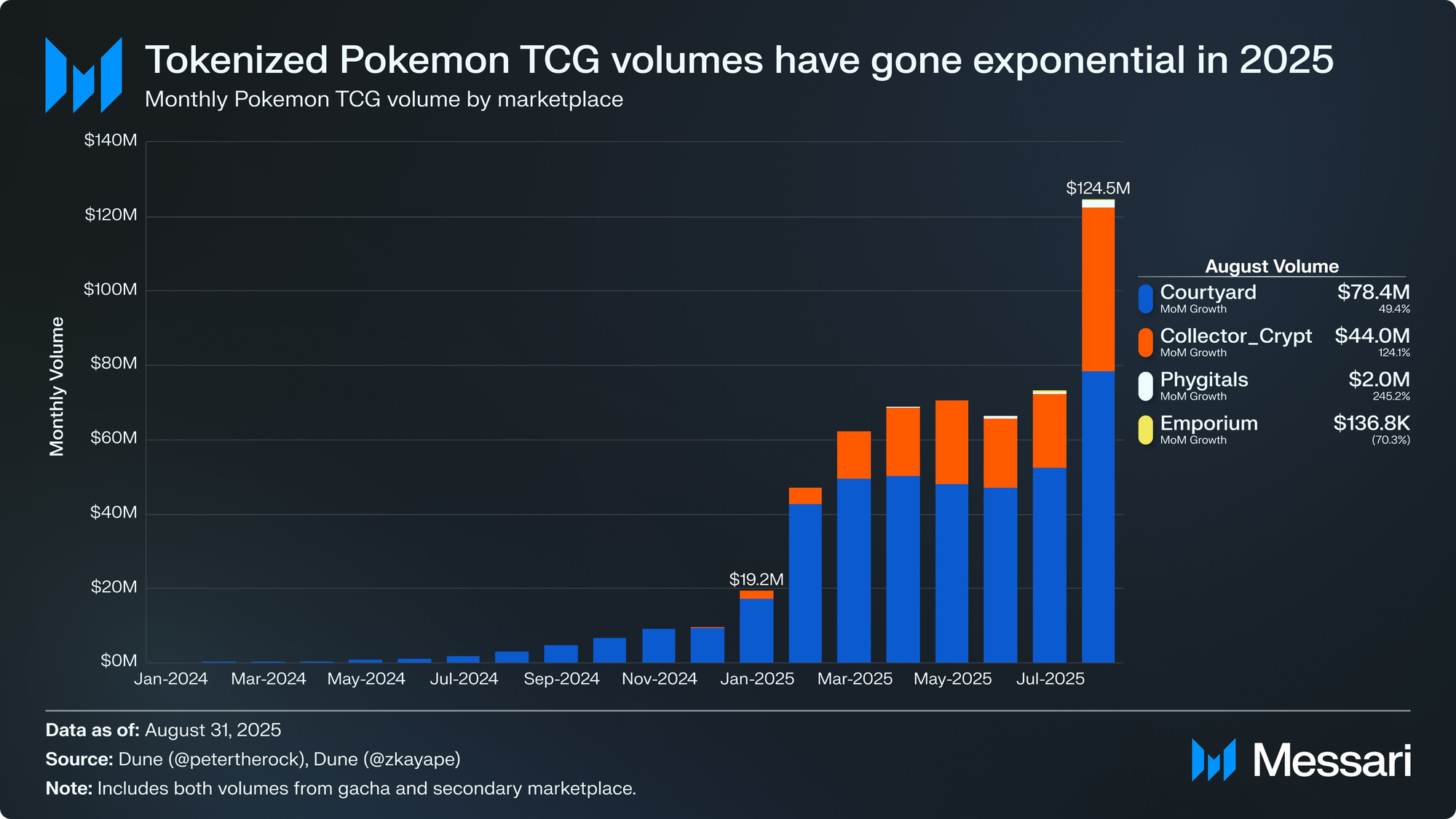The Top Tokenized Pokémon Card Platforms

Pokémon cards onchain. At first, the idea may seem weird. However, upon closer inspection, this crossroads makes plenty of sense.
As Bitwise's Danny Nelson recently highlighted, Pokémon cards are a multi-billion dollar market that, at least until now, has been offchain, informal, inefficient, etc.
In contrast, card tokenization platforms offer various new advantages here, like 24/7 global liquidity, instant resells, DeFi composability, transparent provenance, vaulting services, and so forth.
These perks are starting to catch on, too. Last month, the top card tokenization platforms did over $120M in transaction volume, mostly via Pokémon cards through digital pack rips, secondary trades, and Gacha games.

All that said, there are already a couple of established projects in this space and a growing cast of upstarts.
By now, you've likely heard of Courtyard. Open for over two years now atop Polygon, it pioneered the vaulted physically-backed NFTs approach that has become popular among tokenized card platforms. Pokémon cards are Courtyard's main attraction, particularly via its packs Vending Machine, but it stands out for also supporting sports cards and collectible comics. With nearly $80M in volume last month, Courtyard's at the head of the pack right now. As for KYC, there is none except for when it comes to redeeming cards to have them shipped to you, though your data is deleted after 90 days and Courtyard never sees it.
However, the next biggest oncomer, Collector Crypt, is catching up. Built on Solana, the platform did $44M in volume last month, exclusively through Pokémon cards in its marketplace and its Gacha Machine. Besides this exclusivity, it can also be contrasted with Courtyard in that it has a native token live in $CARDS, which has surged to an $85M market cap since launching less than a week ago. Just note, the platform asks you to provide personal info to withdraw funds (e.g. name, address, last 4 digits of your SSN, etc.), so DYOR and don't deposit anything you're not willing to sign for, so to speak.
Another newer project gaining ground on Solana is Phygitals. You don't have to deposit anything here as you can just bring your own wallet, e.g. Phantom, for trading in the Marketplace. And like Courtyard, you only provide KYC info if you're redeeming cards. The platform's $2M in volume in August marked a 245% increase in activity month over month, so it's starting to uptrend. Beyond its cards shop, Phygitals also has a neat Claw Machine for buying random Pokémon packs, with prices running from $1 to $500 for pulls. A new auction system is also in the works that will let users bid on premium cards.
Another platform on Solana worth noting is Emporium. Like Phygitals, it uses Privy for account creation, so you can sign in with your email or a Google account. Similarly, you don't have to deposit here either, as you can connect your own wallet. Out of the projects I've mentioned so far, I found Emporium's Vending Machine to have the slickest card opening UX as far as speed and ease of buying and selling goes. It lets you buy random PSA 10 graded Pokémon cards at 60 USDC a pop, and if you don't like your pull, you can instantly sell the card back for 85% of its market value. As for redemptions, you just provide your address and pay for shipping ($25 for up to 10 cards).
Now, the aforementioned platforms are the most recognizable in the tokenized cards scene today, but the field here is quickly getting wider. Some other new projects worth keeping an eye on include:
RIP.FUN
RIP is built on Base, and it's currently in closed beta, so you'll need an invite code to dive in at this point. It's designed to be a hub for onchain Pokémon cards, so you can open mystery packs, redeem cards, swap them in trades, track sets, etc. It also offers an EXP points system that can be used to unlock perks like special collectibles.
Grailed
Grailed is built on Solana, and it's another tokenized Pokémon cards marketplace where you can shop secondary card listings or digitally open packs. It's unique from the other projects mentioned so far in that it denominates its offerings in its own virtual currency, Gems, 1,000 of which cost 0.05 SOL. The cheapest pack I saw listed here was for 2,862 Gems, so about $30 currently.
ToCa
ToCa is built on Solana, and it offers something like PoolTogether's prize games. In other words, this isn't a cards marketplace but rather a hub of prize pools that are each backed by PSA 10 graded Pokémon cards. To join in, you simply buy ToCa's native $TCG token, with each $20 you hold counting as a unique entry for all the active pools here.
Beezie
Beezie is built on Flow, but it also supports crosschain payments via ETH, SOL, etc. Plus, Flow is compatible with the EVM, so you can bring your existing Ethereum wallet over to get started. Beezie does a little bit of everything, including tokenization and vaulting services. Its main attractions though are its general marketplace and its Claw Machine, which lets you do instant resells for 90% of any card's market value. The platform also supports comics and sports cards.
DYLI
DYLI is built on Abstract, and it has a range of Pokémon offerings (e.g. graded cards, ungraded cards, single booster packs, sealed collections, etc.) and non-Pokémon products (e.g. precious metals, merch drops, Magic: The Gathering cards, etc.). The platform also offers some basic Dabble and Flip games that are a fun and lightweight way to get some random cards. Plus, there's a Creator Studio here that you can use to set up your own merchandise drops.
Drip
Drip is built on Ronin, and it supports a variety of physical collectibles beyond just Pokémon cards. It also stands out for offering a shopping livestreams functionality where community sellers can host video experiences, like rip or ship campaigns. If you're getting into any action on Ronin lately and want to branch out beyond the gaming scene, this is one prime option you can consider right now.